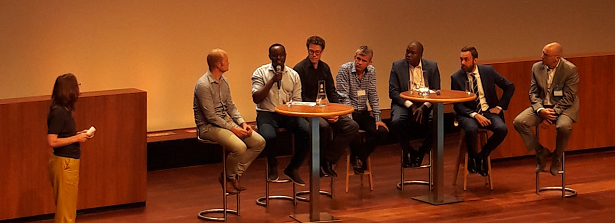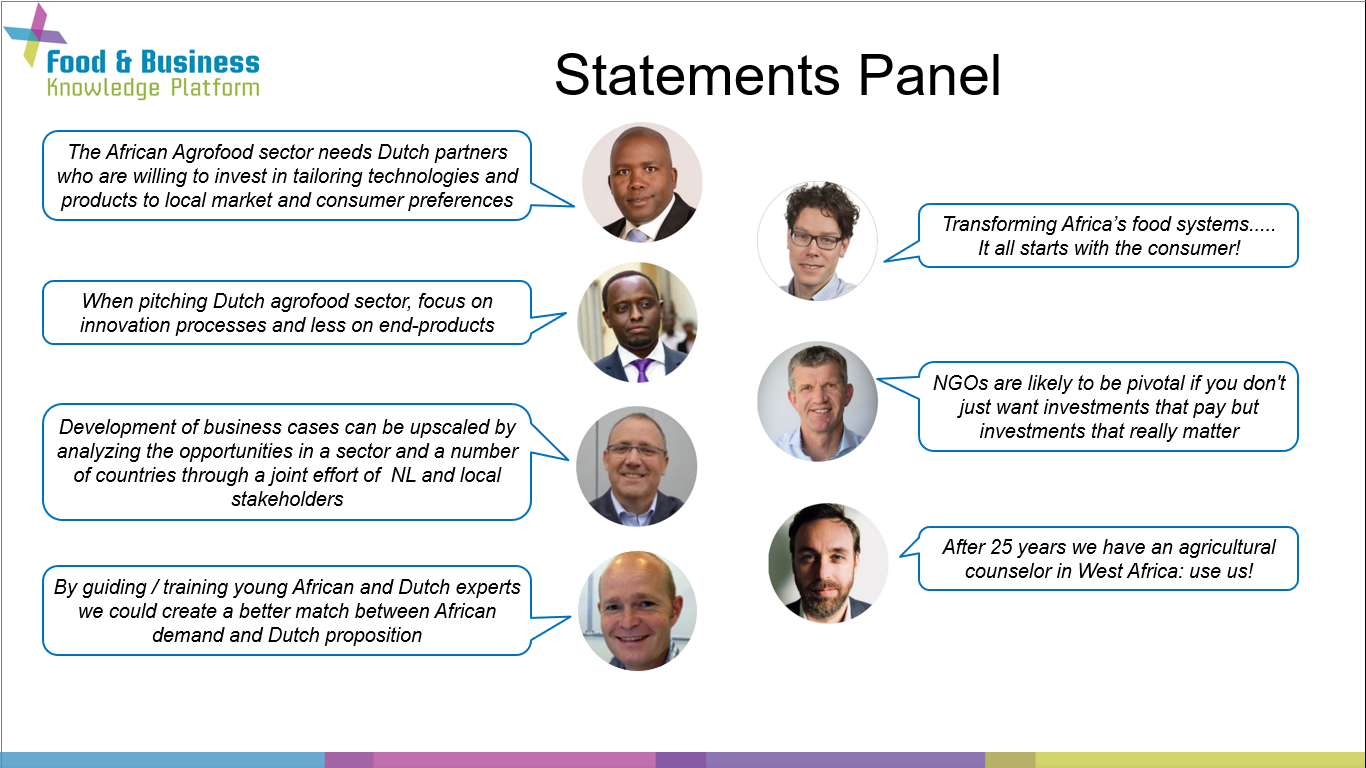New modes of joint action to enhance Dutch agrofood sector investments in Africa

“Articulating demand is crucial”
“The biggest challenge for investors are trained and skilled people”
“Platforms of local and Dutch companies are crucial connectors of different worlds”
These were the main modes of joint action formulated during the workshop “Private sector coalitions to feed African Cities”, organized by the Food & Business Knowledge Platform (F&BKP) as part of the foodFIRST conference on June 1, 2018 in Utrecht. Frans Verberne, director of the F&BKP explained this workshop is also part of a series of activities under the umbrella of the “Innovation Network Feeding Cities” supported by various stakeholders.
Dutch agrofood companies play a significant role in the increasing worldwide demand for (fresh) food produce. The intensive agrofood system in the Netherlands offers high value food production, with attention for health and sustainability. The integrated approach and the strong linkages between private sector, knowledge and education, civil society, government (Golden Triangle, Dutch Diamond) are a unique selling point. In addition, the innovative capacity of the sector helps to transform high-tech and high-org innovations for local purposes in emerging economies.
A lot is happening, both on the private and public side, but it is believed that the agrofood sector can do even better, using the opportunities offered by the growing cities and contributing to sustainable food systems and jobs. International food chains are not the focus. It’s about local private sector development which is inclusive and sustainable and contributes to food and nutrition security for various groups of consumers. The leading question during the workshop: “How can the Dutch agrofood sector achieve a better match between what they have to offer (techware, software, orgware) and the demand of local private and public-sector actors?”
The African voice
Presenters Peter Muthee – CEO of Latia Agribusiness Solutions Ltd, an organization that facilitates business relations in Africa – and Pascal Murasira – New business business developer at Resilience BV, an organization that supports start-ups and innovations in Africa – shared their insights from the local African demand perspective. What Africa needs, according to Peter, is collaboration on knowledge and skill sharing, together with the willingness of Dutch companies to invest in long term relationships, to adapt and customize their technology. The Dutch proprietary technology is also stressed as one of the key elements for a fruitful partnership with local entrepreneurs by Pascal. He stresses the importance of innovating for the future next to scaling best practices. Additional key tips to make partnerships work include the network the local partner can provide, joint-efforts to go to scale and well implemented branding and marketing.
The Dutch Business community
A diverse panel represented the voice of the Dutch agrofood sector. From the Dutch Business community, Errol van Groenewoud – COO Omnivent, an organization specialized in storage facilities – shared his experience with adapting his storage facilities to the local reality in Africa. He advises companies who would like to invest, to also invest in long-term partnerships. Not only look at the investment climate, but take also political stability, socio-cultural dynamics, infrastructure, climate and poverty into account. Norbert van der Straaten – Founder Holland Greentech, an organization that provides training and products to farmers in the Horticulture sector in East-Africa – stresses that the combination of being an agent offering tailor-made services from a range of Dutch horticulture companies and providing on-farm training and advice to farmers is successful and results in job opportunities for young people. The biggest challenge for investors is trained and skilled people.
Use us for insights, impact and matchmaking
Next to companies, key players in the Dutch agrofood sector are facilitating and supporting institutions such as knowledge institutes, NGOs and government institutions or embassies. Thom Achterbosch from Wageningen Economic Research believes the urban consumers’ perspective is key in articulating demand. Knowledge institutes can provide insights in urban food system dynamics and costumer preferences that help businesses to set the scene. They furthermore add to the evidence base that is needed to anticipate the impact investments could have.
“Adding NGOs to the Dutch diamond makes the diamond more shiny”, according to Gert van der Bijl – Corporate Engagement Manager Solidaridad – development organizations can be important in reaching impact and scaling up as they have contacts with the private sector in African countries and regions. They can help in further developing platforms and collaborations.
Nigeria is the building block for West-Africa. Lagos will have more inhabitants than Germany in the near future. Bram Wits – agricultural counselor in Ghana, also working for other countries in West-Africa – underlines that being present on the ground is the most important. His advice: be there, get good partners. Don’t try to develop work from the Netherlands. Use the Agricultural counselors to facilitate matchmaking.

Discussion and concluding remarks
Sigrid Wertheim-Heck – Aeres University of Applied Sciences and Wageningen UR – moderated the panel discussion. The potential of collaboration between African companies and Dutch counterparts from private sector, government, research and civil society is known. Sharing lessons learned and experiences on the how question remain relevant. Some issues were highlighted in the discussion. The demand and needs from the African consumer, producers and entrepreneurs need to be starting point. The consumer perspective, changing diets especially of the urban population, health motives and the associated higher vegetable intake, will change agriculture and the overall food system. Commercial viable value chains depend on consumer demand since they are going to pay for the product. Consumer motives are complex and vary, each of them being a potential entry point for entrepreneurs.
An enabling environment, by e.g. stimulating regulation is needed. Financing the agrofood sector is crucial, which is subject of another workshop at the conference (Critical Capital). Dutch technological support is welcomed by African entrepreneurs but should be very well adapted to the need and not just be a blueprint (“take two steps back”). Even more emphasis should be given to facilitate African partners to develop their own products and build their capacity to do the required R&D.
Sigrid Wertheim-Heck closes the discussion by stating there are untapped investment opportunities for large multinationals as well as smaller sized businesses in Africa. Seizing the opportunities means establish partnerships between local entrepreneurial spirits and the Dutch agri-business community. However, local conditions are challenging and Dutch knowhow and technology require customization to local conditions. Doing business in Africa is not an easy quick win, but the potential impact can be large. Matchmaking seems a most crucial step in the process.
Learn more about the proposed modes of joint action by taking a look at the PowerPoint presentation. An overview of the insights and experiences of the presenters and panel members can also be found in this presentation.
_ _ _
The Food & Business Knowledge Platform and MVO Netherland initiated the Innovation Network Feeding Cities. Activities of the Network are organized in consultation with: BoP Inc/Business Accelerators, Topsector Agri&Food, Topsector Horticulture and Starting Materials, Holland Horti International, AgriProFocus, Netherlands Enterprise Agency (RVO), NL International Business (VNO-NCW en MKB-Nederland), Netherlands International Works (“De Werkplaats”), Ministry of Foreign Affairs, Ministry of Agriculture, Nature and Food Quality.
More on previous events organized by the Innovation Network Feeding Cities, including reports on the roundtable discussion and the podcast on Feeding Cities, can be found at https://knowledge4food.net/expert-roundtable-feed-growing-global-cities/






My organization has hosted an urban farmers network in Nairobi and surroundings for a decade and a half. Urban farmers’ biggest problem is recognition and acceptance of their products. We have been training these famters for a long time including on hygiene and food handling, in collaboration with government extension people. They win the national prozes as best small farmers but they cannot get their products certified by the Kenya Bureau of Standards (KEBS), thus blocking progress. This aspect of the urban agro-food system needs attention.